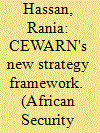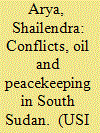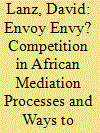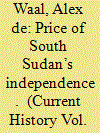|
|
|
Sort Order |
|
|
|
Items / Page
|
|
|
|
|
|
|
| Srl | Item |
| 1 |
ID:
120221


|
|
|
|
|
| Publication |
2013.
|
| Summary/Abstract |
A decade after establishing the Conflict Early Warning and Response Mechanism (CEWARN) of the Intergovernmental Authority on Development (IGAD), the member states endorsed the new strategy framework that is to guide the work of CEWARN until 2019. Although the original legal foundation upon which CEWARN was founded did not specify the types of conflicts that it could be involved in, CEWARN chose to limit itself to cross-border pastoral conflicts. This was partially due to the low levels of confidence between the member states, which prevented CEWARN from engaging in other types of conflicts that are considered to be more 'political' and thus more 'sensitive'. The hope was that after asserting its own success in dealing with cross-border pastoral conflicts, CEWARN would be able to expand its geographical as well as thematic scope. Thus, the most pronounced aspect of the new strategy framework is the expansion of CEWARN operations beyond their current limited focus. Although it is too early to assess the new strategy framework, I attempt to provide a reading of the future of this strategy plan, with particular reference to Sudan and South Sudan. I argue that despite the rhetoric that accompanied the endorsement of the new strategy, the prospects of the new plan in Sudan and South Sudan depend on a number of factors: first, enhancing the mutual trust between Sudan and South Sudan with regard to exchange of information; second, changing Sudan's perceptions with regard to IGAD; and third, securing the much-needed funding for such an expansion of CEWARN's work.
|
|
|
|
|
|
|
|
|
|
|
|
|
|
|
|
| 2 |
ID:
140318


|
|
|
| 3 |
ID:
180894


|
|
|
|
|
| Summary/Abstract |
This article seeks to make sense of the dynamics of competition in African mediation processes and to outline approaches for effective cooperation between mediators. To this end, it analyzes four cases of recent peace processes: Sudan (1994–2005), Kenya (2008), Madagascar (2009–2013) and South Sudan (2013–2015). The article identifies four driving forces of competition among mediators: clashing interests of states involved in mediation, overlapping mediation mandates, incompatible norms guiding conflict resolution, and mediators’ lack of performance. These factors risk undermining peace processes unless the involved mediators and guarantors take active steps to mitigate the negative effects of competition. This can be done through ‘hierarchical coordination,’ where a recognized authority takes the lead and allocates roles to other actors, or through ‘collaborative cooperation,’ where partners have unity of purpose and decide on a division of labor based on comparative strengths.
|
|
|
|
|
|
|
|
|
|
|
|
|
|
|
|
| 4 |
ID:
120220


|
|
|
|
|
| Publication |
2013.
|
| Summary/Abstract |
The Intergovernmental Authority on Development's (IGAD) Conflict Early Warning and Response Mechanism (CEWARN) 2012-2019 Strategy Framework has proposed that the CEWARN mechanism expand its conflict typologies and geographic coverage. The argument advanced in this paper is that the proposed CEWARN expansion should be welcomed. Since its establishment in 2003, CEWARN had restricted itself to dealing with cross-border pastoral conflicts among the member states. However, conceptually and legally, CEWARN was not precluded from dealing with other types of conflict. Firstly, in the past, any conflict, other than cross-border pastoral ones, had been considered by the member states as firmly within their national jurisdiction that mechanisms like CEWARN are precluded from handling. Secondly, CEWARN, which has hitherto been dependent on external donations, just does not have the requisite financial resources to expand its coverage. Thirdly, and most importantly, governments often know the imminence of some, if not all, of the conflicts because they cause them. Thus, they are not interested in reacting to them. In the end, the paper concludes that the proposal to expand CEWARN's conflict portfolio and geographic spread may just remain that - a proposal.
|
|
|
|
|
|
|
|
|
|
|
|
|
|
|
|
| 5 |
ID:
138406


|
|
|
|
|
| Summary/Abstract |
When they celebrated independence on July 9, 2011, the people of South Sudan hoped that the fundamental problems that had doomed the united nation of Sudan over the previous 55 years had finally been resolved. At long last, as citizens of their own independent sovereign nation, South Sudanese would no longer be a minority subject to racial and religious discrimination, and robbed of their immense natural resources—water, farmland, and oil—by northern compatriots, who often bore a greater resemblance to colonizers than fellow citizens.
|
|
|
|
|
|
|
|
|
|
|
|
|
|
|
|
| 6 |
ID:
172094


|
|
|
|
|
| Summary/Abstract |
This article examines the regional security predicaments surrounding Ethiopia’s access to the sea and thus to international markets for foreign trade. It takes regional stability and wealth as key variables for exploring the security dilemma caused by Ethiopia being landlocked in the Intergovernmental Authority on Development (IGAD) region. The findings of the qualitative analysis of secondary data suggest that intra- and extra-regional conflicts, weak intra-regional trade and poor infrastructure are the major obstacles to the country’s sea access and foreign trade. These problems exist despite (arguably weak) attempts at regional peacebuilding and trade and infrastructure development through external assistance and funding. Thus, strengthening such efforts remains a viable remedy for the regional dilemmas related to Ethiopia’s quest for access to the sea.
|
|
|
|
|
|
|
|
|
|
|
|
|
|
|
|
| 7 |
ID:
102660


|
|
|
|
|
| Publication |
2011.
|
| Summary/Abstract |
This article assesses the contribution that IGAD has made to regional security in the Horn of Africa since the adoption of its peace and security mandate in 1996. It describes the evolution of IGAD and its mandate in the context of regional conflict and wider African peace and security processes. It explores the local dynamics of the two major IGAD-led peace processes, in Sudan (1993-2005) and in Somalia (2002-2004), and discusses the effectiveness of IGAD's institutional role. A consideration of the wider impact of the peace agreements highlights the way IGAD has enhanced its role by setting the agenda on peace support operations in Somalia. The article concludes that IGAD's successes are more the result of regional power politics than of its institutional strength per se. Despite the obvious need for a better regional security framework, the scope for the IGAD Secretariat to develop an autonomous conflict-resolution capability will remain limited. However, IGAD brings a new diplomatic dimension to conflict management that locks in regional states and locks out interested parties beyond the region. With regard to Somalia, the organization has played a pivotal role in directing African and wider international responses to conflict in the region.
|
|
|
|
|
|
|
|
|
|
|
|
|
|
|
|
|
|
|
|
|